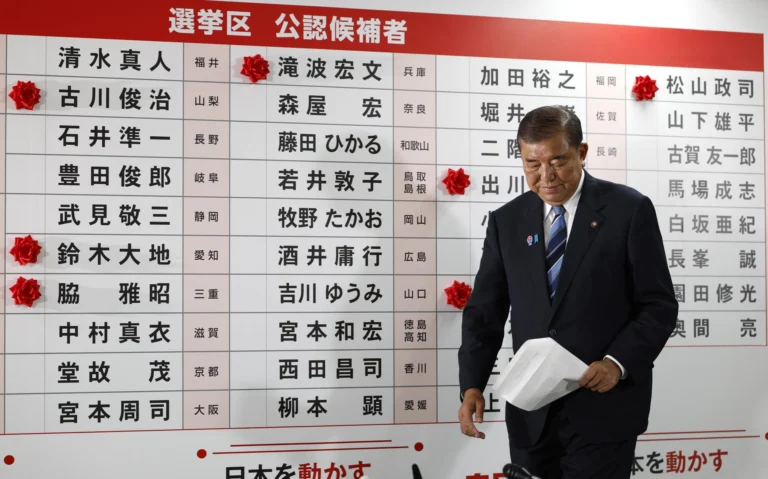Japanese Ruling Coalition Will Lose Majority in Upper House, According to NHK

Shigeru Ishiba, Japan’s Prime Minister and president of the ruling Liberal Democratic Party (LDP), walks past a board with red paper roses showing elected candidates at the LDP headquarters in Tokyo, Japan, 20 July 2025. Photo: EFE/EPA/FRANCK ROBICHON / POOL
July 20, 2025 Hour: 6:25 pm
Projections from public broadcaster NHK indicate that the ruling coalition in Japan, led by Prime Minister Shigeru Ishiba, will lose a majority in the upper house of parliament following Sunday’s election. The final official results will be published in the next few hours by the national electoral authority.
RELATED:
Japan Reelects Ishiba as Prime Minister Amid Political and Economic Challenges
The Liberal Democratic Party (LDP) coalition of Ishiba and Komeito did not reach the necessary seats to maintain a simple majority in the house.
The coalition formed by Ishiba’s Liberal Democratic Party (LDP) and its governing partner, the Buddhist Komeito, had secured 46 seats, down from the 50 needed to maintain a simple majority in that chamber, according to NHK.
According to NHK, the ruling coalition consisting of the Liberal Democratic Party (LDP) and Komeito together wins 121 seats. The LDP would remain the dominant force with 100 seats, although there is a loss from its 114 pre-election seats. Komeito is also experiencing a decline from 27 to 21 seats. This consolidation keeps the coalition in command, albeit with a slight reduction in its representation.
In the opposition and other parties, the Constitutional Democratic Party (CDP) practically retains its former strength with 37 seats (versus 38), while Japan Innovation remains stable with 18 seats. A noteworthy fact would be the remarkable growth of Sanseito, which goes from 2 to 14 seats, becoming a more relevant actor on the political scene. Other major opposition parties, such as the Democratic for the People, remain with 21 unchanged seats.
Some parties, such as the Japanese Communist and NHK Party, would lose representation; the former drops from 11 to 7 seats, while the latter falls from 2 to only 1 seat. On the other hand, new minority forces or parties emerge, such as the Conservative Party (2 seats) and Team Mirai (1 seat), which achieve modest access to parliament.
The ruling coalition will thus be deprived of its majority in both houses of the Diet, the Japanese Parliament, after the defeat it suffered in the Lower House in the general elections last October, which puts the viability of the Government at risk and could trigger calls for Ishiba’s resignation within the LDP.
These results put Prime Minister Ishiba in a difficult position, who in previous hours stated his intention to remain in office even if they lost control of the Upper House, arguing that the LDP is still the most voted force and has a responsibility to the citizens to fulfill its electoral promises.
Ishiba, who already governs in minority, faces a complex political scenario, given that all opposition parties have ruled out joining any coalition with the PLD.
PLD voters appear to have punished the party, to the detriment of populist formations, in the current climate of increasing citizen outrage over rising living costs, the absence of notable achievements by the Ishiba Executive, and the tariff negotiations with the United States still open.






